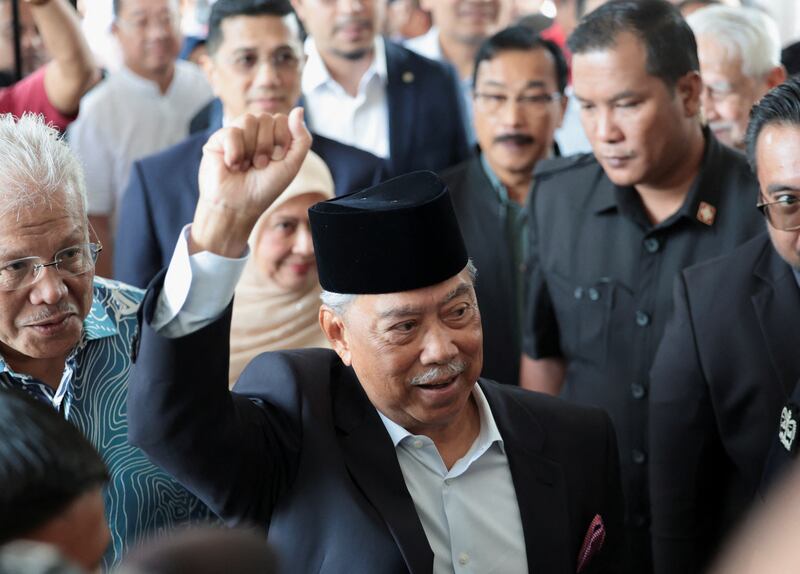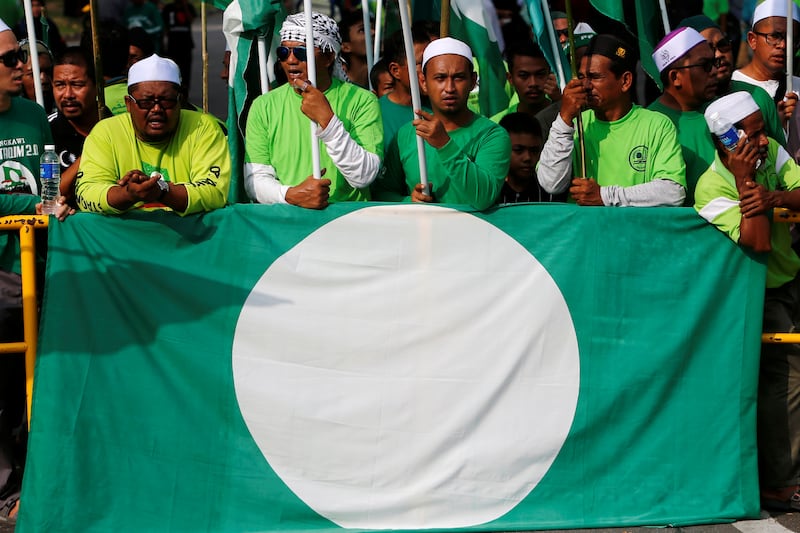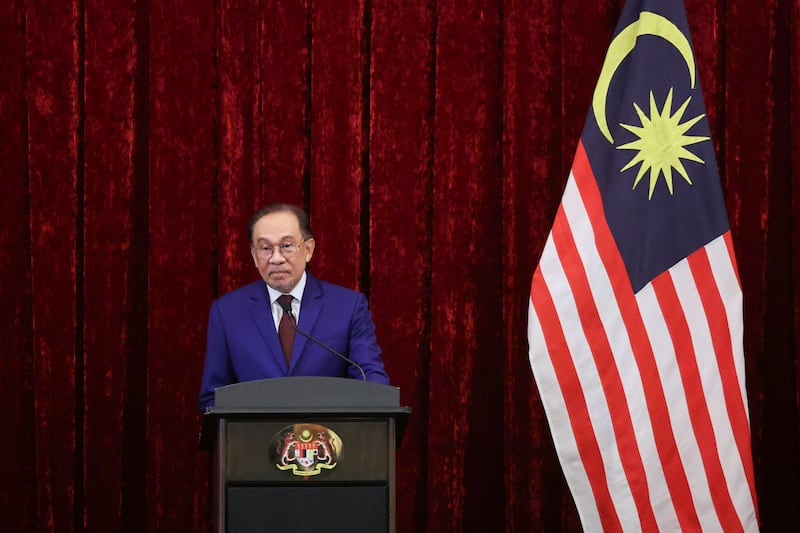Two years after Anwar Ibrahim's government took power in Malaysia, the opposition Perikatan Nasional coalition continues to hold onto its base but has not meaningfully been able to expand it.
In fact, PN has lost momentum over the past year, especially the Malay nationalist party Bersatu led by former Prime Minister Muhyiddin Yassin. Bersatu is one of three parties that comprise PN, with the Malaysian Islamic Party (PAS) the strongest and Gerakan, included to try to expand the appeal to non-Malays, the weakest.
Several factors have curtailed the opposition over the last year. While the coalition has been hurt by corruption charges against some of its leaders, its main obstacles are internal, namely political infighting and an unwillingness to perform the role of an effective national political opposition.
Electoral erosion
The opposition’s political erosion is evident in this year’s election results.
Of the four by-elections this year, the opposition lost three. Bersatu contested all of those lost by the opposition. In one of these, Nenggiri in Kelantan state, the party lost an incumbent seat.
A closer analysis of the results shows that the PN coalition largely held onto its Malay base when facing Anwar's coalition but lost ground when facing the beleaguered Malay nationalist party UMNO.
Opposition under pressure
The erosion of support is partly due to many opposition leaders facing criminal charges.
Minimally these have been a distraction for the leaders, a long-time tactic in Malaysian politics. The charges have also spilled over into public perception, reinforcing partisan divisions.
Among them, former Prime Minister Muhyiddin had corruption and abuse of power charges dismissed in 2023, but those were reinstated this February on government appeal, and he failed to get them thrown out in September.
After comments perceived as against Malaysia's royalty in a by-election, Muhyiddin was also charged with sedition in August. The case is ongoing.

The number of opposition leaders and their loyalists facing charges and investigations has risen to over 10 individuals in the past two years. The list extends from the political secretary and son of opposition leader Hamzah Zainuddin being charged for corruption to Muhammad Sanusi Md Nor, the PAS Kedah chief minister, facing sedition. The latter was acquitted this week.
These charges have been compounded by “divide and rule” tactics, as there have been talks aiming to convince PAS to leave PN and join Anwar’s government. So far, these talks have failed but they have fueled disquiet among some within the opposition who understand the appeal of being in government.
This happened after six parliamentarians left Bersatu due to incentives to receive government allocations and were allowed to keep their seats by the government’s House speaker despite a law introduced in 2022 to curb political defections.
Opposition tensions
Inevitably, the pressures have affected relations within the opposition.
Questions are being asked whether Muhyiddin should be PN’s prime minister candidate. PAS openly started promoting their own in a by-election last December and this has gained traction over the year, causing tensions between PAS and Bersatu.
The tensions go beyond leadership, extending to the viability of the alliance itself.
In the relationship between PAS and Bersatu, the former has provided ground support while the latter has provided resources and served as a bridge to Malay nationalists, especially in the traditional UMNO political base.

Concerns have been raised about whether Bersatu is still fulfilling its role, especially since the party’s accounts have been frozen by the Malaysian Anti-Corruption Commission and public perception of Muhyiddin have shifted.
Within PAS, there is growing resistance to working with Bersatu. Party grassroots have not strongly supported Bersatu candidates in the by-elections, a factor feeding resentment.
Bersatu is also seen as holding too many leadership positions in the PN coalition leadership structure. The main PAS leader in the PN leadership structure, Terengganu Chief Minister Ahmad Samsuri Mokhtar, resigned from his PN treasurer position this week. This tactic is seen as heightened pressure on Bersatu to make way for PAS leaders.
PAS is aiming for a more dominant role in the opposition, with some party members advocating for the group to separate from Bersatu.
The party’s focus has been on showcasing its governance role, with its event of the year being the formation of the State Government Four (SG4) company aiming to pool resources for the four state governments it controls. At the same time, the party is rethinking its political relationships.
Party infighting
Bersatu has been inward-focused as it wrestles with its internal struggles. The party is divided into two major factions: between deputy president Hamzah and former trade minister Azmin Ali.
Bersatu faced its party election this year in November where these issues were brought to the fore. There were considerable attempts to reduce tensions and accommodate the two groups. After the polls, Azmin Ali was made secretary general of Bersatu and PN. Others left the party over concerns about leadership issues.
Unfocused opposition
Divisions within political parties are common. What’s not common is PN’s reluctance to take on the opposition role.
Rumors of opposition leaders trying to woo UMNO and other parties to form an alternative government have persisted throughout the year. This speaks to the eagerness of the opposition wanting to get back into government and access power.
As an opposition in the parliament, PN has underperformed. They have raised issues, but have yet to offer different policies and reinforce perceptions that they can govern nationally, especially to manage the economy.

This week, former Prime Minister Mahathir Mohamad joined PN in a press conference accusing the Anwar government of depriving Malays of their rights and calling Malay leaders to unite against a “common enemy.” This racialized refrain has been Mahathir’s repertoire for nearly 50 years, and only serves to further polarize rather than bridge Malaysia’s political divisions.
Views against PN among non-Malays have not shifted, with fears of a " green wave" persisting and a rejection of ultra-Malay nationalism.
As an opposition, PN lacks focus and a clear set of national issues. It is reactive rather than proactive in messaging.
When the Anwar government passed controversial bills impinging on free speech this past week, with a few of its own coalition members in attendance, the opposition was not even able to rally its numbers to stop the legislation.
A coming reckoning
These problems limit the opposition’s appeal, weakening the opposition.
The result is that as Anwar’s government has alienated his progressive base, the opposition’s issues have meant it has not broadened its support as well.
Two years on from the 2022 general election, Malaysia’s opposition PN is weaker than it was, especially Bersatu. If the 2024 trends continue, PN’s aim of forming the government will become more elusive.
Thus, it is no wonder the stronger party in PN is evaluating its ties inside the coalition. Recent developments foreshadow a reckoning among PN parties over leadership and further strains within the coalition.
For Malaysia as a whole, a weaker opposition means persistent political polarization and less traction toward the reforms the country needs.
An independent researcher, Bridget Welsh is an honorary research associate at the Asia Research Institute of University of Nottingham Malaysia in Kuala Lumpur and a Senior Associate Fellow of The Habibie Center. The views expressed here are her own and do not reflect the position of the University of Nottingham Malaysia, The Habibie Center or BenarNews.
